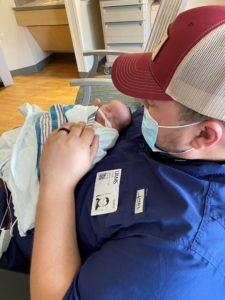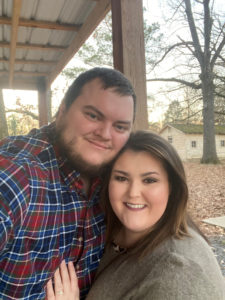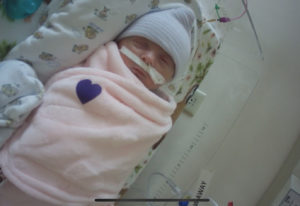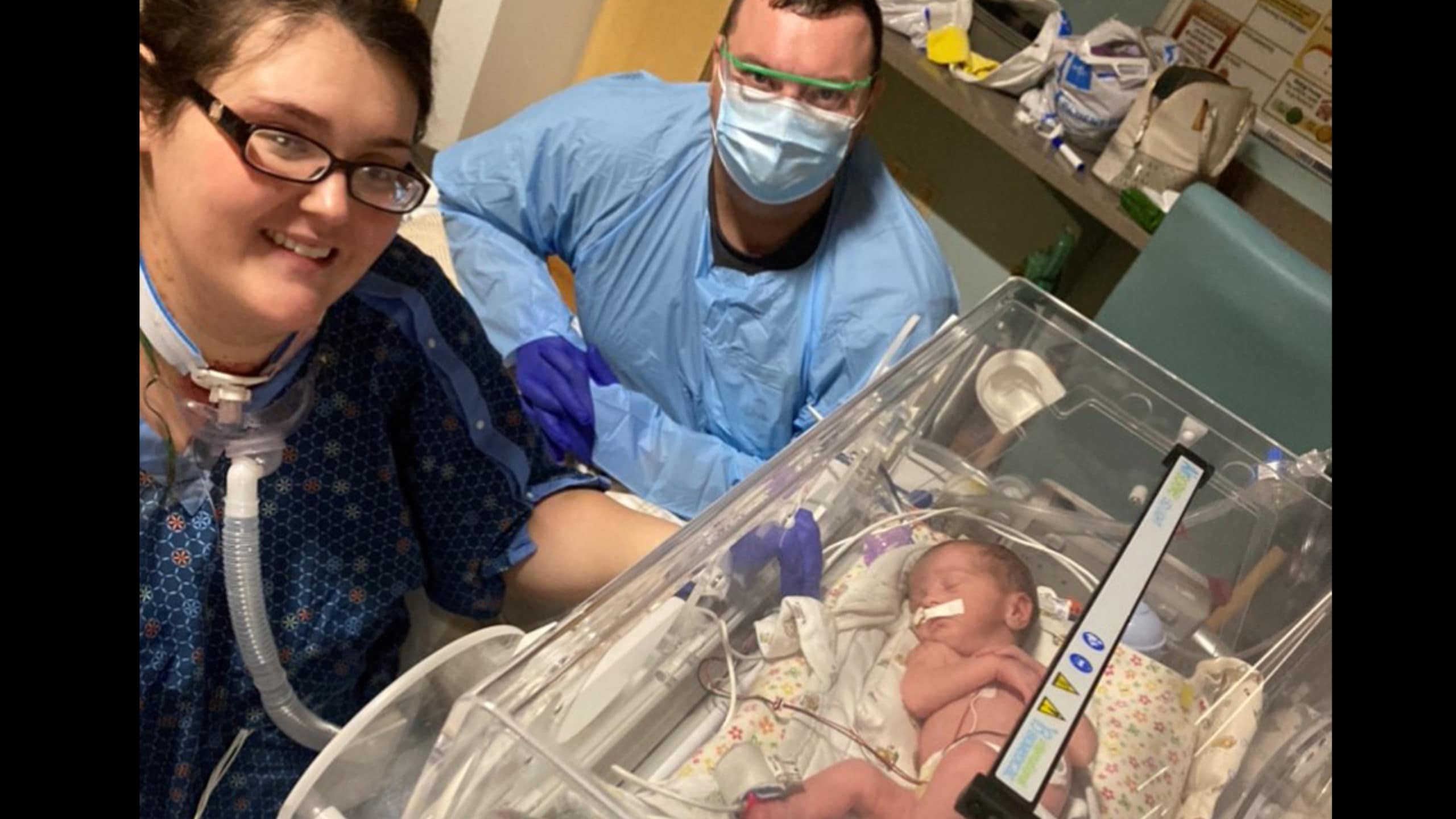Family’s Happy Ending Almost Derailed by COVID-19
Young Couple Urges Others to Get Vaccinated
| Celia Ann Reed was two weeks old when her parents got to hold her for the first time in a hospital room at the University of Arkansas for Medical Sciences (UAMS) Medical Center.
The 3-pound, 6.5-ounce girl was born May 27 in an emergency Cesarean section while her mother, diagnosed with COVID-19, struggled to survive.
Watch the CBS News report about the Reed family
Ashton Reed, 25, had expected to deliver her first child during the first week of August, after a full-term pregnancy. But she was 30 weeks into her pregnancy – about 10 weeks away from due date – when COVID interfered.

Charles Reed with his 2-week-old daughter, Celia Ann.
Nine days earlier, husband Charles Reed, 27, had driven her from their Star City home to a hospital in Pine Bluff when she became dehydrated, which they suspected was connected to her regular bouts of morning sickness.
Instead, she was diagnosed with COVID-19 and sent home to recuperate.
Like a large number of Arkansans in their age group, the Reeds hadn’t been vaccinated against COVID-19. Ashton Reed said she feared the vaccination might hurt her developing child. She said a doctor had told her that the long-term consequences were unknown. Charles Reed said he, too, was wary about possible side effects.
But Ashton Reed acknowledged that even if she hadn’t been pregnant, she probably wouldn’t have gotten the vaccine.
“It wasn’t on my mind. I didn’t take it seriously,” she said.
She worked at the Jefferson County prosecuting attorney’s office as a coordinator of services for elderly crime victims, where she dealt with the public regularly. But she was young and lived in a small town, so she thought she was safe.
The mother-to-be returned to the Pine Bluff hospital on May 21, struggling to breathe, throwing up and unable to stop coughing. She also had diarrhea and a fever.
But there was only so much doctors could do.
On the night of May 26, as her oxygen levels continued to drop to dangerously low levels, she was transferred to UAMS.
At UAMS, Reed’s oxygen requirements continued to increase and, despite additional oxygen, her pulse ox levels, or the percentage of oxygen saturated in her blood, was dipping down to 70%, much lower than the normal level of 95-100%.

Charles and Ashton Reed
Doctors at first used a nasal cannula, a thin tube, to provide supplemental oxygen to help Reed breathe. Then they switched to a mask that covered her face and was connected to a BiPAP machine, which pushes pressurized air into the lungs, to open them and let in oxygen.
When her pulse ox dropped into the 50% range, doctors called Charles Reed and told him they were planning to induce labor at 11:15 a.m. on May 27, in an effort to save his wife. Data showed delivering could improve her chances of survival.
“Then it got worse, and they said they were going to have to do an emergency C-section,”
he recalled, checking the Notes app on his smartphone where he had meticulously recorded his wife’s rapidly changing medical situation.
“At 2:15 p.m., we had our little girl,” the young father said.
Ashton Reed’s oxygen levels shot back up right after the birth. But as relieved as the young father was that both his wife and daughter suddenly had a better chance of survival, he wasn’t able to see either one of them in person.
Then doctors told him that his wife’s condition had worsened. They said a ventilator wasn’t doing enough to help her, and that she needed to be placed on the ECMO machine to keep her alive.
The technology, which became available to UAMS patients in March, removes carbon dioxide from a patient’s blood and sends oxygen-filled blood back into the body. By providing mechanical circulatory and respiratory support, it allows a patient’s heart and lungs to rest.
Meanwhile, the couple’s baby remained in isolation in the Neonatal Intensive Care Unit (NICU), where she was closely monitored around-the-clock for potential health problems.
As the days ticked by and Ashton Reed’s life hung in the balance, Charles Reed felt helpless. He hadn’t seen his wife in person since she was loaded into the ambulance in Pine Bluff for the ride to UAMS, and now he also couldn’t see their baby girl, despite being vaccinated after his wife was admitted to UAMS.
But thanks to Angel Eye cameras on every bed in the NICU that allow parents to watch their newborns through an app on their smartphones, he found some relief.
After six days of being sedated and on the ECMO machine, Ashton Reed was able to fully comprehend that she’d had given birth. The young parents also were able to converse through texts and phone calls, and spent a lot of time accessing the live video of their daughter.
Ashton Reed said she later learned that at one point, “my oxygen was so low I almost had brain damage.”
Finally, on June 10, doctors determined it was safe to let Charles Reed, donned in protective gear, hold his daughter in his arms.
“It was amazing,” he remembered. “I was on cloud nine. When you hold her, nothing else matters.”
The next day, doctors wheeled the tiny girl, wrapped in two blankets inside a clear-covered transport isolette, into the room where her mother had been moved on June 7 after being disconnected from the ECMO machine.
Ashton Reed still had a tracheotomy and a feeding tube. But at long last, her husband was able to be by her side, and she was able to see her baby and hold her for the first time, under the close supervision of four nurses, including two from the NICU and one who specializes in infection prevention.
“It’s probably the most peaceful and completed feeling,” she said. “She completes my life, and Charles’ too. She is such a blessing.”
Nurses snapped the first photo of the happy mom, dad and baby together.

Celia Ann
Between coughs indicating she still had some recuperating to do, the young mother said she wanted to get a message out to others who have been reluctant to get vaccinated: “Now I know this is deadly. Get vaccinated.”
Charles Reed agreed.
“I’ve talked to nearly everybody I know lately, urging them to get vaccinated because we don’t want anybody to go through what we went through,” he said. “I almost lost my wife and my child.”
“We recommend vaccination before, during and after pregnancy,” said Nirvana Manning, M.D., chairperson of the Department of Obstetrics and Gynecology in the UAMS College of Medicine, who was on call the night Ashton Reed arrived.
“Millions of pregnant women have now been vaccinated without any significant concerns,” Manning said. “Pregnancy increases your risk of requiring oxygen, being intubated and going to the Intensive Care Unit. We as well as our national societies recommend vaccination of pregnant women.”
UAMS Chancellor Cam Patterson, M.D., MBA, said the hospital is seeing a surge in patients with COVID-19, particularly younger patients, requiring high levels of care, such as being in ICU or on a ventilator.
“It has been heartbreaking for me to see young mothers and fathers in our ICUs requiring mechanical support because of COVID-19 infection,” he said, urging all Arkansans to get vaccinated.
A few days after Ashton Reed was able to hold her daughter for the first time, she was released from the hospital. The new parents said they plan to return to the hospital regularly to visit Celia until she gets bigger and they can take her home, probably about the first week of August.
The couple thanked the UAMS team of specialists who took care of them and their baby.
“It was just a miracle,” Charles Reed said, looking at his wife and daughter. “This is a miracle baby.”
